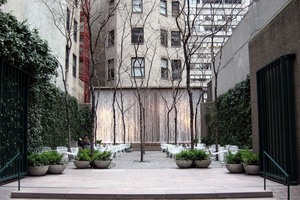Tucked away in the heart of Midtown—only a few blocks from its sister park, Greenacre—lies the beautifully minuscule refuge that is Paley Park. Dubbed a "vest-pocket" park, it's just 4,200 sq ft., and serves as a retreat from the daily grind of the urban world that exists just outside of its borders.
Paley Park’s most significant feature is the 20-foot waterfall that reaches across the entire back of the small space, creating a soothing buffer of sound that helps to drown out the bustle of the surrounding city. The white noise combined with the encompassing ivy-covered walls and the shelter of honey locusts provides a convincing illusion of privacy and seclusion, fostering an atmosphere of tranquility in the city that never sleeps.
Commissioned and financed by the William S. Paley Foundation, and finished in 1967, Paley Park is a privately owned public space. William Paley, a former chairman of CBS, was very involved in the conception and design process of the place. He named Paley Park in honor of his father, and commemorated his efforts with a plaque that reads, “This park is set aside in memory of Samuel Paley, 1875–1963, for the enjoyment of the public," near the entrance.
In William H. Whyte’s 1980 text and subsequent film, The Social Life of Small Urban Spaces, Paley Park’s social environment and relationships were analyzed. Whyte wished to understand what made places like Paley Park successful, and what drew people to spontaneously enter. He concluded that despite creating an atmosphere of solitude, Paley Park is still very much an urban space: Midtown is still very visible from the entrance, and the sidewalk just below Paley’s stoop is heavily traveled. This dichotomy works in the park's favor. People are drawn into the park off the busy sidewalk, coaxed away from their routines, if only for a few moments, to go sit in Paley with the din of the waterfall all around them.
